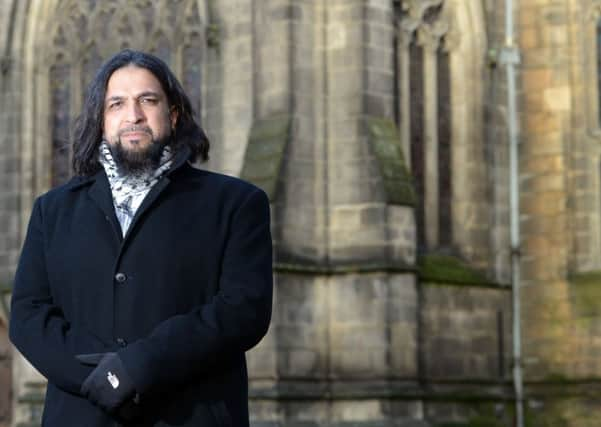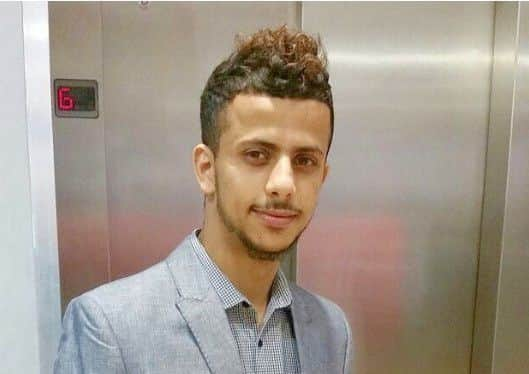The former Thai boxer becoming Yorkshire's next QC


“I accept I don’t look like a stereotypical barrister. My clerks have had calls asking for ‘Jesus’ from people who don’t know my name but have seen me in court and want me to represent them.” With his beard and flowing, shoulder-length hair, Gul Nawaz Hussain is indeed far removed from the usual expectation of what a criminal lawyer should look like - but there is no doubting his effectiveness in the courtroom.
The 42-year-old father-of-three has become the first Sheffield-based criminal defence lawyer for 15 years to be appointed as a Queen’s Counsel, a much sought-after title granted to the country’s most effective courtroom advocates that opens the door to working on criminal cases of the very highest profile. Hussain, who has also recently been made joint head of Bank House Chambers in Sheffield, will formally be sworn-in as a QC next month at a ceremony in the Palace of Westminster. He says the ceremony will be an incredibly proud moment for his family, who have been elated since his appointment was confirmed in late December.
Advertisement
Hide AdAdvertisement
Hide Ad“The worst part of our job is having a jury out deliberating upon someone’s guilt or innocence when you are just sat there waiting for a verdict and this was similar.


“My application was submitted in March and I then had to wait until the start of September to find out if I had got an interview. The interview was later that month but then I had to wait until just after before Christmas to learn if I’d been successful.
“We were all in the car coming back from school when the email came through. I gave had given my the phone to my wife and she told me. She started screaming with joy as did the kids. I just didn’t couldn’t believe it. Everybody was going crazy with joy in the car, it was like the scene in Wayne’s World.”
He has relied heavily upon the support of his wife and children. “Hiba and the children have been a huge source of strength for me. Learning of my success whilst we were all together was perfect”.
Advertisement
Hide AdAdvertisement
Hide AdTheir unconfined joy is little surprise given Hussain’s journey to this point in his career. His father Mahboob came to England in the 1960s from the Kashmir region of Pakistan when he was 11 and entered the world of work aged just 12, first in the textile mills of Lancashire before moving to the steelworks of South Yorkshire. He eventually started a family with his wife Zahida Parveen and they settled in Tinsley in north-east Sheffield.


Hussain’s father’s lack of schooling meant he struggled to read or write in English. But he became involved in trade union activities at the steelworks - and soon found a willing helper in his son. “I would go along with him to meetings to help him out and read things,” Hussain says. “I started to appreciate the importance of having people who are willing to speak for those who are unable to do it themselves.”
He says he became interested in pursuing a career in the law, something his father supported. “He was always pushing my sisters and me towards being academic. My sister got a first-class honours degree in Chemistry as well as a PhD and is now a teacher at Repton School in Dubai. My youngest sister is a police officer and the first to wear a hijab on duty in Yorkshire.
“My father and mother sacrificed so much to give us the best they could. As a teenager when I started to slack my father had a great way to motivate me. He took me to the steelworks, it was boiling hot and everyone’s face was black with dirt. He said ‘If you don’t work at school and put the effort in, you will be coming to work here’. I knew I wasn’t tough enough to do that!”
Advertisement
Hide AdAdvertisement
Hide AdHussain was also kept on the straight and narrow as a teenager by his involvement at the Sheffield Thai Boxing gym, with the discipline and tactical awareness required to practice the combat sport later helping him in the courtroom. “I owe a great deal to my instructor Mick Mullaney and his wife Trix March.”
Along with his father, who marched against the National Front in Sheffield and Rotherham in the 1970s, another hero for a young Hussain was Muhammad Ali, not only for his incredible sporting skills but also for his willingness to speak out and stand up to authority. “It was always imperative to me to try and make a difference.”
As a teenager he also volunteered locally to assist the Citizens’ Advice Bureau and help people with various problems like their right to refunds from shops.
“The area that I lived in was a working-class area, many people also came from an immigrant background. Engaging with services, and understanding what your rights are and demanding those rights is sometimes very difficult. Helping people in this way is advocacy.”
Advertisement
Hide AdAdvertisement
Hide AdAfter doing a law degree and the necessary postgraduate diploma while supporting himself through university by working as a nightclub doorman and martial arts instructor, Hussain then needed to take the vital next step on the path to becoming a barrister; winning a coveted pupillage to work for 12 months in a set of legal chambers against fierce competition. But after an interview, he managed to secure a place at Chambers in Nottingham, working under respected barrister Ian Way.
“I said I wanted to help people and make a difference in society. I was asked ‘Are you on some kind of crusade?’ I thought should I say what I think they want to
hear or say what I feel? It was an easy decision and I said, ‘Yes, I am’. I didn’t think I would get the place. But they called me back and I ultimately got the pupillage. It was a lesson in ‘to thine own self be true’.”
Hussain believes his background has helped him to be a more effective advocate for his clients. “When you have had a real taste of life, you can understand people’s difficulties more. Sometimes you might divulge a little more about yourself to help them understand I know what I’m talking about.”
Advertisement
Hide AdAdvertisement
Hide AdOne of his biggest early cases was being part of the defence team for Manfo Kwaku Asiedu, one of five men accused of a plot to detonate explosives on three Tube trains and a bus in London in 2005. The other four men were found guilty and jailed for life but the jury were unable to reach a verdict on Asiedu on a charge of conspiracy to murder. He later pleaded guilty to a lesser charge of conspiracy to cause explosions and was jailed for 33 years.
He says he drew on his experiences in Thai boxing to help overcome his nerves when he had to conduct the defence case after the QC he was working with fell ill. “What I had been taught at the gym about confidence, not quitting and allowing fear to take control, being focused, I drew upon it all. One of the QCs complimented me afterwards saying you did a fine job.”
Hussain also represented one of three inmates accused of a revenge attack on former Bosnian Serb general Radislav Krstic in Wakefield jail, where the latter man was serving a 35-year sentence for his part in the genocide of 8,000 Muslim men and boys in Srebrenica in 1995.
The men were cleared of attempted murder but convicted of wounding with intent to cause GBH. “You had a convicted war criminal in the witness box, it was quite a surreal case. This guy had a prosthetic leg and you would look at him and see this frail old man. Then you would remember what he had done; aiding and abetting the genocide of 8,000 men and boys.”
Advertisement
Hide AdAdvertisement
Hide AdMore recently, Hussain played a vital role in clearing the name of a Sheffield dessert shop owner called Rassam Ali, who was jailed for three years in March 2015 after being wrongly convicted of a sex attack on a child. After spending 18 months in prison, Ali cleared his name in November 2016 after his original conviction was quashed by the Court of Appeal and the CPS decided not to bring a retrial once new evidence that had been missed in the original police investigation was brought to light by the defence team.
Ali said after the case that Hussain had been “more like a brother than a barrister”.
Hussain will also soon be involved in defending men accused of being involved in historic child sexual exploitation offences in Rotherham.
“In a bizarre way, crimes of murder and violence are quite easy to deal with. Sexual offences take more of a toll on you, particularly if they involve children. But it is an area of law where real miscarriages of justice can happen.”
Advertisement
Hide AdAdvertisement
Hide AdHussain says the answer to the age-old question of how lawyers defend people accused of appalling offences is simple. “People who ask that question have a fundamental misunderstanding of what the justice system is. Every person has a right to be represented regardless of what they are accused of.
“Imagine your door gets put through at 2am by the police and you are arrested for sex offences with a child. You know you haven’t done it, your family might stand by you but gradually your friends and work colleagues think you must have done it as ‘there’s no smoke without fire’. Do you want someone to represent you who thinks the same as them and prejudges you or someone who says ‘I’m here to do my job and do all I can to explain your side of the story’?
“My job is to put forward a person’s case in the best way I can. But it is not like in the films. If someone tells me they are guilty, I can’t mislead the court.
“The biggest misconception of barristers is that cross-examination has to be done crossly. Generally, you won’t achieve anything by doing that. You can do your job properly without going out there to upset someone.
Advertisement
Hide AdAdvertisement
Hide Ad“When on the rare occasion you may get cross, the jury have to be with you.
“An old joke is that life at the criminal bar is acting for ugly people. Joking aside, there is a degree of theatre involved and being able to read and guide the jury.”
Inspiring the next generation
Gul Nawaz Hussain has been supporting South Yorkshire Police’s ‘Inspiring Youth’ initiative, which is designed to give teenagers an insight into the possibility of pursuing professional careers.
“I’m very grateful to Judges Wright and Dixon at Sheffield Crown Court for inviting me to help. It is about giving kids confidence and encouraging them to do positive things. Not everyone wants to pursue an academic or professional career but these are important life skills we all need.
Advertisement
Hide AdAdvertisement
Hide Ad“There are different kinds of pressure, from worries about whether they will be accepted by people from more privileged backgrounds but also some people around them who will say you are a sell-out for wanting to achieve academically. They have to have the skills and confidence to silence both those groups.
“If I was going to go back and talk to my 18-year-old self, I would never have believed I would become a QC. Young people need to have the confidence to pursue their dreams and know how to deal with failure too.
“Ultimately all you can do is give it your best shot. Fear kills more dreams than failure ever did.”